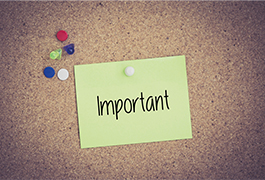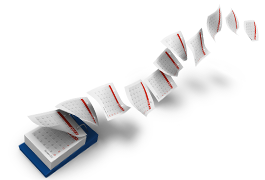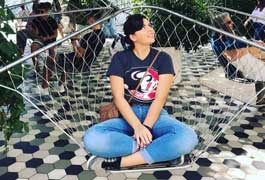Making the Most of Grad School Visits
You spent all of last semester sweating the graduate school application process, and the results are in: You got in to your top three choices. Congratulations! Now all you have to do is pick the right program to lay the foundation for the rest of your career. Easy, right?
Maybe not, but visiting graduate schools is a critical part of the decision-making process. Here’s how to make the most of these all-important visits.
Why visit graduate programs, and when?
Graduate school is intensely rigorous and challenging, but also enriching, intellectually stimulating, and exciting. You want to be sure to choose a program that best fits your personal and professional goals. Although you can learn about a school’s target research areas from afar, getting a feel for the school’s culture, surrounding area, and social environment can occur only by being there and seeing everything firsthand.
More importantly, meeting advisors, students, and program administrators before committing to a program is critical to making a sound decision. Your research advisor will shape your research projects and strongly influence the fields you enter after you graduate. Your classmates and labmates will become your network and support system. And, although you can certainly transfer from one graduate program to another, doing so can set you back a year or more on thesis work, which means there is more at stake in finding the right place for you than you may realize.
Planning the visit
So when should you do your visits? Unlike college visits for undergraduate programs, you usually visit graduate programs after you get accepted. Most chemistry programs will pay for some or all of your visit. With this in mind, you might want to take advantage of spring break by scheduling a whirlwind trip to check out several programs.
Whether you are part of a recruiting weekend or your visit is tailored just to you, you will spend one to two days meeting, greeting, and touring. Plan on meeting with several professors in your field of interest and with current students. There may also be a social event with students, professors, and other candidates. Occasionally, you might meet with a department chair or administrator who will provide general information about the program; however, your main interactions will be about research.
Before your visit, look up information about the program and the ongoing research. Also, meet with your advisor or a mentor for any insider tips and insights about the program, faculty, and research. Talking with alumni of the institution is also a good idea.
Questions to ask during your visit
You will have an opportunity to meet with students as well as professors in your field of interest. Here are questions to ask them.
For professors:
- How many graduate students/postdocs do you have? Will you be accepting new students next year?
- What avenues are most exciting to you in your research?
- What are the long-term prospects in [your field of interest]?
- Do you work with graduate students directly, or do they spend more time being mentored by senior students/postdocs?
- When do students start publishing? When do students start presenting at professional meetings?
- Will I have opportunities to: Teach extra semesters? Participate in an internship? Engage in joint research? [insert whatever opportunities match your goals]?
- I am interested in [insert your career aspirations] after I graduate. Have any of your students gone on to do that? If you aren’t sure about your career aspirations, ask what other students have done after graduating.
For grad students:
- How are students mentored?
- Does your advisor care more about how many hours you spend in the lab or about what types of results you get?
- How often do you meet with your advisor?
- How does your advisor react when you hit a difficult patch?
- How are conflicts resolved?
- What do you wish someone had told you before you got here?
- Do you serve on department governance, a committee, or student organization? If so, how active is it? How has it influenced you?
- Does your advisor support activities outside of research?
- How do you like living here?
- How hard is it to find housing/medical care?
- Does your stipend cover your needs?
- What do you do for fun?
Questions to ask of anyone:
- What is the procedure for selecting a research advisor?
- Is there an opportunity to try rotations (test rides) in laboratories before a selection is made?
- How are student deficiencies diagnosed? How are they addressed?
- Is coursework available in [fill in your career goals]?
- Does the department have (at least) annual evaluations, and are IDPs (Individual Development Plans) used?
- What is the average time it takes for students to complete their coursework (typically 1-2 years), graduate (typically 5-7 years), and secure their first job after graduation?
- For what period of time am I guaranteed financial support? Is that support for 12 months? How long will I work as a Teacher’s Assistant (TA)?
Avoid pitfalls
Here’s how to avoid common pitfalls during your visit:
- Don’t underdress. Yes, you have already been accepted to the school, but you have not been accepted into a research group. You want to make a good impression on your potential colleagues and advisors.
Do wear nice but comfortable clothes. Slacks, long sleeves, and supportive shoes are great for the lab tours. Suits are not necessary but completely acceptable. - Don’t run late. The schedule was set up for your benefit. Honor it by being there on time.
Do follow up on good conversations. If a conversation is running long, politely ask if you can follow up after the visit, then do so when you get home. - Don’t look at your cellphone. Your phone distracts you from the company you are with and could give the impression that they are less important than your device.
Do turn off your phone (or at least the ringer) while you’re meeting with professors and students, and excuse yourself to check messages. - Don’t trust your memory. After meeting a lot of people, taking in a lot of information, and seeing new places, it is easy to lose what you think you’re storing in your head for later reflection.
Do bring a notebook or notepad to jot down your impressions in the moment. - Don’t overindulge in drinking alchohol. Getting drunk—or even tipsy—is the fast track to a bad impression.
Do go easy on the alcohol or skip it altogether to stay focused, alert, and fresh.
Reflecting on your visit
You are collecting a lot of information, which is bound to get jumbled in your mind. If you take good notes, you’ll be able organize your thoughts about each program and reflect on them comprehensively and concretely.
After your visits, review your notes and ask yourself these key questions for making your final determination:
- Does this program give me the opportunities I need to reach my career goals?
- Does this program offer flexibility if my goals change?
- Is there more than one research group I want to join?
- Do I want to be like any of the students I met?
- Do I feel that I will be treated fairly here?
- Do I like the location?
- How does the financial aid package compare with the cost of living for the area?
There are no right or wrong answers to any of these questions; it’s all about what feels right to you.
Remember, you will be spending a lot of time in graduate school, and it will have a major impact on your career. Stay focused throughout your visit and gain as much information as you can from the people you meet.
By taking full advantage of the visit, you are on your way to finding the best fit for you.





